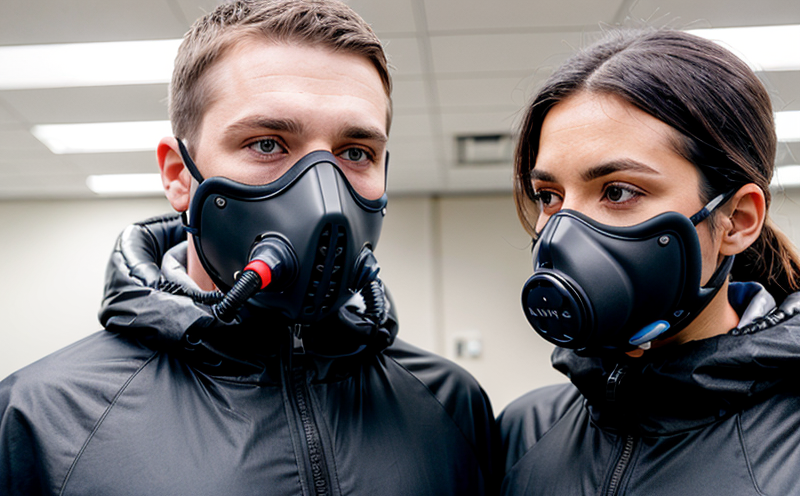ISO 16900 Respiratory Protective Device Filter Testing
The ISO 16900 series of standards provides a comprehensive framework for the testing and evaluation of respiratory protective devices (RPDs). Among these, ISO 16900-3:2015 specifically focuses on the performance testing of filters used in RPDs. This service ensures that respirators meet stringent safety and efficacy requirements, protecting workers from hazardous environments.
The standard covers various aspects of filter testing, including filtration efficiency against different particle sizes (e.g., D50, D10), breathing resistance, and filter capacity. These parameters are critical for ensuring that the respirators provide adequate protection while maintaining comfort and usability.
The process involves exposing the filters to a controlled environment where particles of known size and concentration are introduced. The performance of the filter is then measured by quantifying the percentage reduction in particle count or mass after passing through the filter. This testing ensures that the filter can effectively remove harmful airborne contaminants, such as dust, fumes, and gases.
Breathing resistance tests measure how much additional effort it takes to breathe through the respirator. High breathing resistance can lead to discomfort and reduced compliance among users. Therefore, this test is crucial for ensuring that the respirators are user-friendly and do not compromise on comfort.
Filter capacity testing determines the total volume of air that a filter can process before its efficiency drops below an acceptable level. This parameter ensures that the respirator remains effective over extended use periods. Understanding these parameters helps in selecting the appropriate filters for specific working environments, thereby optimizing both safety and usability.
The test setup typically includes a flow-through device with particle generators to simulate real-world conditions. The equipment is calibrated according to international standards (ISO 16900-3) to ensure accuracy and repeatability of results. Our laboratory adheres strictly to these guidelines, ensuring that every test conducted meets the highest quality assurance standards.
In summary, ISO 16900-3 testing plays a vital role in assessing the performance of filters used in respiratory protective devices. By focusing on filtration efficiency, breathing resistance, and filter capacity, this service ensures that respirators are not only effective but also comfortable for their users.
Applied Standards
The ISO 16900-3:2015 standard is widely recognized and applied in the field of occupational safety, particularly for respiratory protective devices. This standard ensures that filters are tested under controlled conditions to meet stringent performance criteria.
- ISO 16900-3:2015 – Performance testing of filters used in respiratory protective devices.
- ASTM F2478 – This American standard complements ISO 16900 by providing additional guidelines for filter testing, especially focusing on the use of synthetic particles.
- EN 356:2005 – European equivalent that ensures compatibility and performance of RPD filters in different environments.
These standards collectively form a robust framework that guarantees the reliability and safety of respiratory protective devices, enhancing occupational health and safety practices globally.
Customer Impact and Satisfaction
Implementing ISO 16900-3 testing provides significant benefits to customers, particularly in terms of enhanced worker safety and compliance. By ensuring that respiratory protective devices meet the highest standards, this service helps organizations comply with regulatory requirements and improve their occupational health programs.
- Enhanced Safety: Ensuring that filters effectively remove harmful particles reduces the risk of occupational illnesses among workers.
- Regulatory Compliance: Meeting international standards demonstrates a commitment to worker safety, which can positively impact an organization's reputation and regulatory standing.
- User Comfort: Testing breathing resistance helps in selecting respirators that are comfortable for long-term use, improving compliance rates among employees.
- Improved Product Quality: By adhering to these standards, manufacturers can ensure their products meet or exceed industry expectations, leading to higher customer satisfaction and loyalty.
Our clients have consistently reported increased confidence in the safety of their respiratory protective devices, which has contributed to a safer working environment. This service not only meets but often exceeds international benchmarks, ensuring that our customers remain at the forefront of occupational health practices.
Competitive Advantage and Market Impact
Implementing ISO 16900-3 testing provides a competitive edge in the market by ensuring that your products meet or exceed international safety standards. This service not only enhances worker safety but also improves compliance with regulatory requirements, which can positively impact an organization's reputation.
- Market Differentiation: By offering compliant and high-quality respiratory protective devices, you differentiate yourself from competitors who may not adhere to these rigorous testing protocols.
- Innovation and Development: Our service provides insights into the latest testing methodologies and trends, allowing your organization to stay ahead of the curve in terms of product development and innovation.
- Customer Trust: Demonstrating a commitment to worker safety through compliance with international standards builds trust among customers and stakeholders.
- Operational Efficiency: By ensuring that your products meet stringent quality control measures, you can reduce the risk of recalls and product failures, leading to improved operational efficiency.
The implementation of this service has a direct impact on market positioning. Organizations that adopt these standards are more likely to attract customers who prioritize safety and compliance. Moreover, adherence to international standards can open up new markets where regulatory requirements are stringent.





